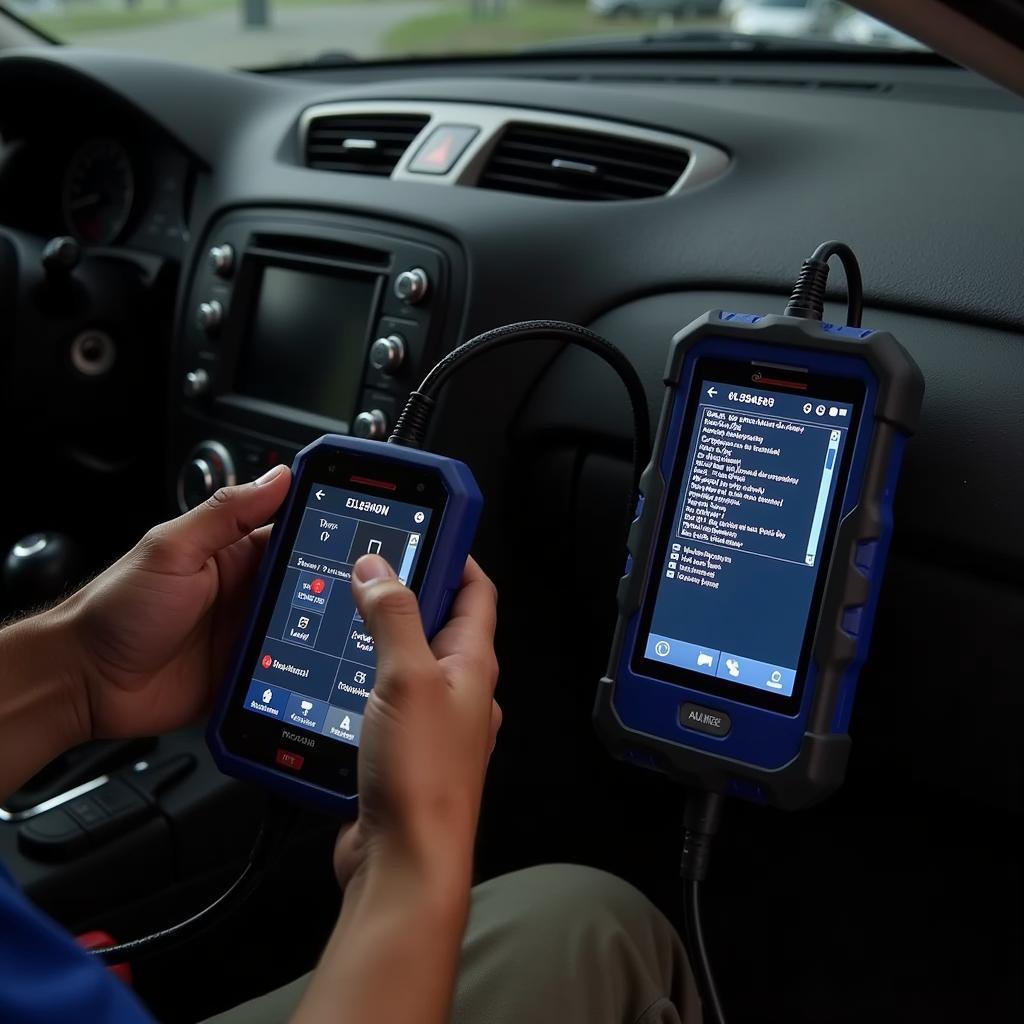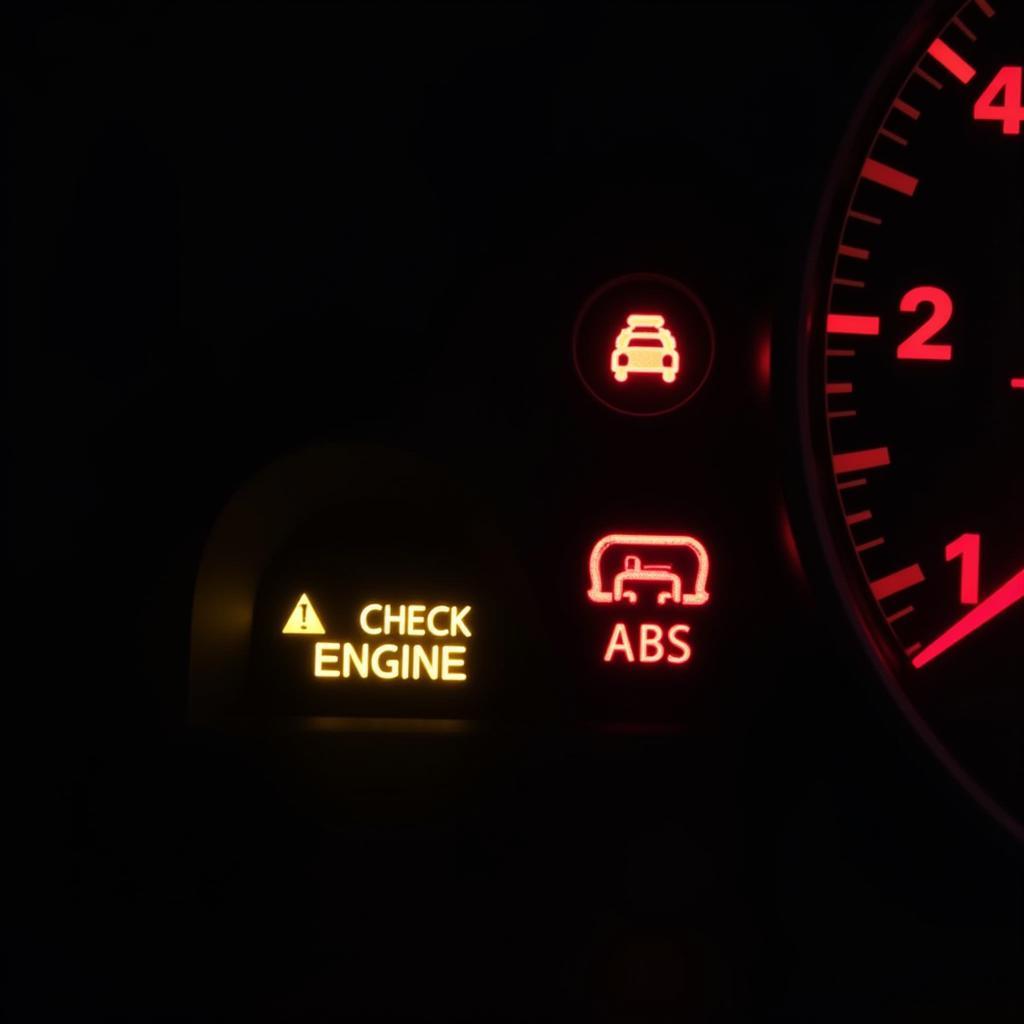A car diagnostic test, using a specialized tool plugged into your vehicle’s onboard computer, can feel like a mysterious process. You might be wondering, “What Does A Car Diagnostic Tell You?” and “Is it really worth it?”. In simple terms, it’s like getting a health checkup for your car. This guide will demystify the world of car diagnostics, explaining what they reveal, their importance, and how they empower you to keep your vehicle running smoothly.
Unraveling the Mysteries: Inside a Car Diagnostic Test
 Mechanic Performing a Car Diagnostic Test
Mechanic Performing a Car Diagnostic Test
Modern cars are equipped with onboard computers, also known as Electronic Control Units (ECUs), that monitor various systems. A car diagnostic test accesses these ECUs, retrieving valuable data about your car’s health.
What Information Does a Car Diagnostic Test Provide?
Think of a car diagnostic test as a comprehensive investigation into your vehicle’s inner workings. Here’s what it can reveal:
- Diagnostic Trouble Codes (DTCs): These are standardized codes that pinpoint specific areas where the car’s systems deviate from expected performance. Each code corresponds to a particular issue, acting as a starting point for diagnosis.
- Sensor Readings: The test provides real-time data from various sensors throughout your car, including oxygen sensors, airflow sensors, and coolant temperature sensors. This information helps mechanics understand how well your engine is performing.
- System Status: The diagnostic test can tell you the status of various systems, such as the transmission, airbags, anti-lock brakes (ABS), and emissions control. This is crucial for identifying potential problems before they escalate.
- Freeze Frame Data: When a fault occurs, the car’s computer stores a snapshot of the engine’s parameters at that moment. This “freeze frame” data is invaluable for diagnosing intermittent or difficult-to-replicate problems.
Common Issues a Car Diagnostic Test Can Identify:
- Engine Problems: Misfires, fuel system issues, ignition problems, and emissions-related faults.
- Transmission Issues: Slipping gears, rough shifting, and problems with the transmission control module.
- Brake System Faults: Issues with ABS, traction control, and brake fluid pressure.
- Electrical Problems: Battery issues, faulty wiring, and problems with sensors.
- Airbag System Malfunctions: Problems with airbag sensors, deployment modules, or wiring.
The Importance of Regular Car Diagnostic Tests
 Car Dashboard Warning Lights Illuminated
Car Dashboard Warning Lights Illuminated
“An ounce of prevention is worth a pound of cure.” This saying holds true for car maintenance, and car diagnostic tests play a vital role in preventative care. Here’s why:
- Early Detection and Prevention: Just like regular health checkups, car diagnostic tests can catch potential problems in their early stages, preventing costly repairs down the line.
- Improved Fuel Efficiency: By identifying issues affecting fuel economy, such as a faulty oxygen sensor, you can optimize your car’s fuel consumption and save money on gas.
- Safer Driving Experience: Detecting faults in critical safety systems like airbags, ABS, and traction control ensures a safer driving experience for you and your passengers.
- Increased Resale Value: A well-maintained car with a documented history of diagnostic tests will have a higher resale value.
Do I Need a Car Diagnostic Test? Recognizing the Signs
While regular diagnostic tests are recommended, certain signs indicate it’s time to schedule one promptly. Watch out for:
- Illuminated Warning Lights: The dreaded “Check Engine” light is the most obvious sign. Other warning lights, like the ABS or airbag warning, also warrant a diagnostic test.
- Unusual Noises: Any strange noises coming from your engine, transmission, or brakes should be investigated.
- Performance Issues: A decrease in fuel economy, loss of power, rough idling, or difficulty starting are red flags.
- Changes in Driving Dynamics: Sudden changes in steering, braking, or acceleration can indicate underlying problems.
Car Diagnostic Tests: Empowering Car Owners
 Car Owner Discussing Diagnostic Report with Mechanic
Car Owner Discussing Diagnostic Report with Mechanic
Understanding “what does a car diagnostic tell you” puts you in the driver’s seat when it comes to your car’s maintenance. Here’s how:
- Informed Decision Making: Armed with the information from a diagnostic test, you can make informed decisions about repairs and maintenance, avoiding unnecessary work.
- Cost Savings: Early detection of issues can save you from expensive repairs later. Additionally, you can shop around for the best repair quotes once you know the exact problem.
- Peace of Mind: Knowing the status of your car’s systems provides peace of mind and confidence while driving.
Conclusion: Your Car’s Health is in Your Hands
Car diagnostic tests are essential for maintaining your vehicle’s health, performance, and safety. Understanding “what does a car diagnostic tell you” empowers you to make informed decisions about your car’s maintenance, saving you time, money, and potential headaches down the road. Regular diagnostic tests, coupled with your vigilance and proactive approach to car care, will keep your vehicle running smoothly for miles to come.
FAQs
1. How often should I get a car diagnostic test?
It’s generally recommended to have a car diagnostic test annually or every 10,000 miles.
2. Can I perform a car diagnostic test myself?
Yes, affordable OBD-II scanners are available for DIYers. However, interpreting the results and diagnosing complex issues often requires professional expertise.
3. What is the difference between a car diagnostic test and a code reader?
A code reader simply reads and clears diagnostic trouble codes (DTCs), while a car diagnostic tool provides more in-depth information, such as sensor readings, system status, and freeze frame data.
4. Will a car diagnostic test drain my car battery?
No, a car diagnostic test uses very little power and won’t drain your battery.
5. How much does a car diagnostic test cost?
The cost varies depending on your location and the mechanic, but it typically ranges from $50 to $150.
6. Does DiagFixPro offer car diagnostic services?
DiagFixPro specializes in providing comprehensive information and reviews about car diagnostic tools and services. We can help you find reliable mechanics and diagnostic solutions in your area.
7. Can you tell me more about what does a diagnostic test tell you about your car?
We have a dedicated article on our website that delves deeper into the specifics of what a diagnostic test reveals about your car’s health.
For any further assistance or expert advice, feel free to reach out to our team via WhatsApp at +1(641)206-8880 or email us at [email protected]. Our dedicated customer support team is available 24/7 to assist you.

Leave a Reply